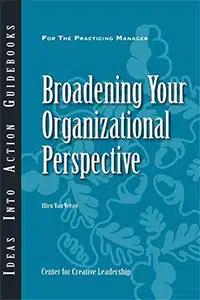Do You Need a Broader Perspective at Work?
The more responsibility you have and the higher up you go in your organization, the more important it is to see beyond your own functional area.
We’ve found that having a broad organizational perspective is a critical leadership competency and one of the most important factors in the advancement of executives.
Looked at another way, having too narrow a functional orientation can lead to career derailment; a promotion might take you beyond your level of competence — and you may be pushed out, demoted, or fired.
4 Signs You Need a Broader Perspective
If you’re concerned you may have too narrow a perspective, you can expand it. Our guidebook, Broadening Your Organizational Perspective, explains how to get a broader perspective.
First, determine what’s getting in your way. It may be, in part, organizational forces. But it may be your own behaviors that are holding you back. Do you tend to:

- Over-rely on strengths? Too much success in one area can lead you to over-rely on what’s been working for you so far. Any strength can become a weakness, leaving you with a gap or limitation when it comes to the next job opportunity.
- Ignore flaws? You probably know your weak spots, or you’ve been given feedback about something to improve. Ignoring this insight is a missed opportunity — one that can potentially derail your career.
- Avoid untested areas? If you shy away from a function or area, the lack of knowledge and experience may become an obvious gap in your repertoire. Don’t think, “I’ve made it this far” and assume it won’t matter down the road.
- Focus on just one type of work? Deep expertise isn’t a replacement for a variety of experiences. A track record of working in different areas or on different types of work demonstrates the versatility needed to move up in an organization.
Underlying these 4 patterns is the inability to learn, to take a risk, and to be challenged by something new. So, to get a broader perspective, go after a variety of challenging experiences — but be sure you will learn from them by intentionally using them as fuel for development and reflecting on them intentionally to glean lessons learned.
Broader Perspectives Emerge When Learning from Experiences
3 Learning Factors Related to Broadening Your View
At CCL, we believe that great leaders are great learners. For a broader perspective, and to boost your ability to learn from your experiences rather than just go through the paces, pay attention to 3 factors. You should have:
1. A willingness to learn.
Understand that new experiences may provoke fear or anxiety. Your performance may suffer in the short term. What’s your motivation and commitment to engaging in and learning from a new experience? How will you handle the emotions that come along with it? How do you respond to a new idea?
2. The ability to learn.
When going through a new experience, you’ll want to determine what’s important for you to learn. This requires vulnerability. Are you able to seek and use feedback? Do you learn from your mistakes? Are you open to criticism without being defensive? Are you an agile learner?
3. Learning versatility.
You also need to understand how you learn — what’s your learning style? Once you’ve identified the tactics you prefer and use most often, you can try new learning tactics to make sure you learn the most from your experiences. (In addition to Broadening Your Organizational Perspective, you may also be interested in Becoming a More Versatile Learner.)
With a solid understanding and commitment to learning, you can find and create experiences that will give you a broader perspective and wider organizational view. As a result, you’ll strengthen your overall leadership abilities, enhance your opportunities for advancement, and improve your ability to adapt to an uncertain and turbulent world of work.
Ready to Take the Next Step?
Upskill your team and help leaders across your organization get the broader perspectives they need for the future. Partner with us to craft a customized learning journey for your team using our research-backed modules. Available leadership topics include Boundary Spanning, Innovation Leadership, Learning Agility, Thinking & Acting Strategically, and more.









